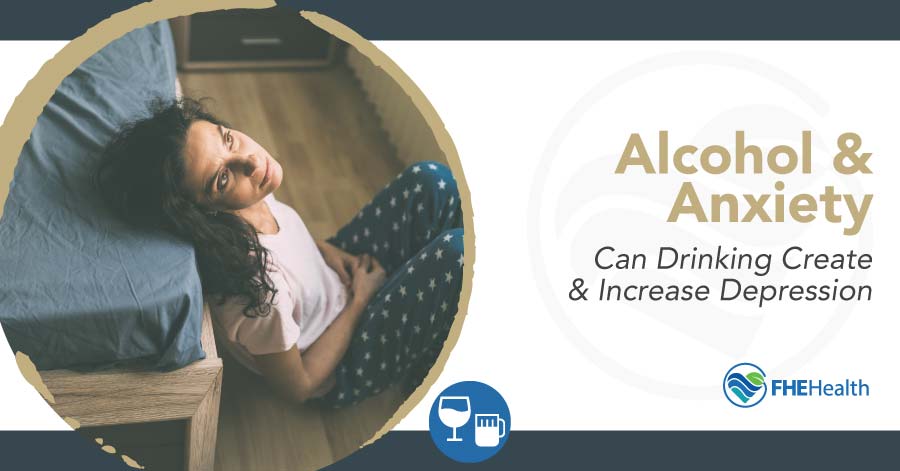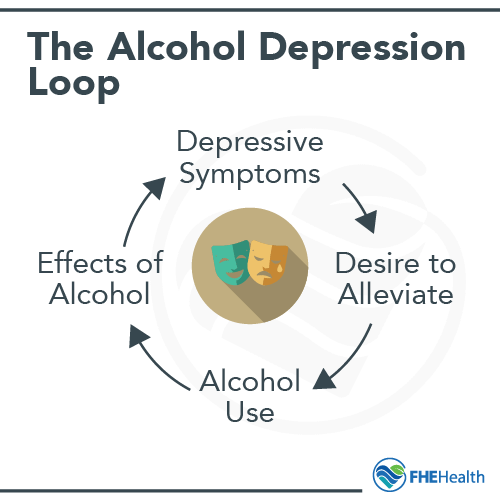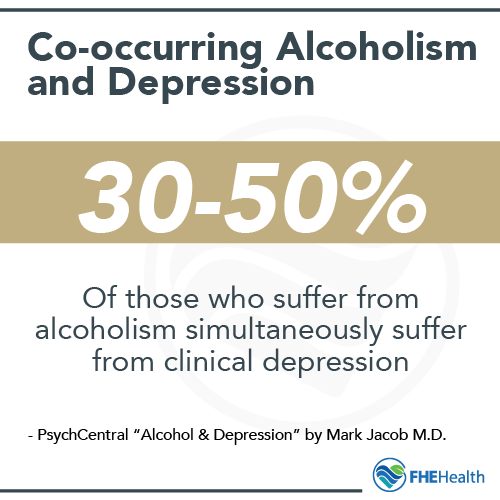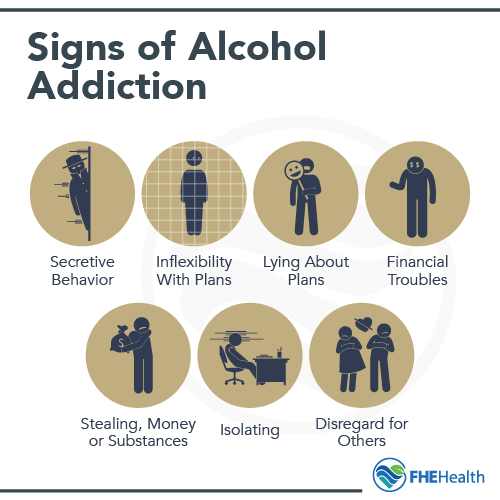
Millions of Americans drink alcohol, sometimes to excess, sometimes to the extent that they develop into heavy drinkers, become alcohol dependent, or progress to alcohol use disorder (AUD). Some have a co-occurring mental health disorder such as depression or anxiety. Yet, whether they have depression to begin with or it occurs from heavy alcohol use, they can find themselves caught in an alcohol-depression-anxiety cycle.
According to the National Institute on Alcohol Abuse and Alcoholism, among those with alcohol dependence, nearly 37 percent met the criteria for an anxiety disorder in the past year and nearly 28 percent— for major depressive disorder. Among those with alcohol abuse issues, the prevalence was 29.1 percent for anxiety disorders and 11.3 percent for major depressive disorder.
What Is the Alcohol Loop and How Does It Involve Depression and Anxiety?
 Most of us are familiar with the concept of a loop from a traffic roundabout or a circular route around a city. The alcohol cycle is a clearly evident in the “cycle of addiction” chart, which shows the alcohol loop and how someone caught up in it goes back and forth between heavy alcohol use and depression, often with accompanying anxiety, and using alcohol to cope with the depression that results from heavy drinking, alcohol dependence or alcoholism, or alcohol abuse or AUD.
Most of us are familiar with the concept of a loop from a traffic roundabout or a circular route around a city. The alcohol cycle is a clearly evident in the “cycle of addiction” chart, which shows the alcohol loop and how someone caught up in it goes back and forth between heavy alcohol use and depression, often with accompanying anxiety, and using alcohol to cope with the depression that results from heavy drinking, alcohol dependence or alcoholism, or alcohol abuse or AUD.
Does Drink Lessen Depression or Anxiety?
Contrary to the popular belief that drink, depression, and anxiety can somehow be mitigated by drinking, the opposite is true. Does alcohol make depression worse the next day? Absolutely. In fact, alcohol use to cope with depression may precipitate a relapse, or lead to suicidal thoughts. Furthermore, research shows that alcohol use increases both the intensity and duration of episodes of depression. A study in the journal Addiction found that attempting to deal with depression with alcohol use doubles the risk to develop either condition. According to the researchers, this isn’t just a correlation, noting that the two disorders are intertwined in the cycle of a reciprocating, causal relationship.
Does alcohol make anxiety worse? What about the effects of alcohol on anxiety? Does alcohol make those who experience anxiety worse the next day? Absolutely. You’re anxious, so you drink. You drink, and your anxiety escalates.
Alcohol, Depression, and Anxiety: A Vicious Cycle
 Alcohol, depression, and anxiety are a terrible combination, but a common one. Deep-rooted emotions, as well as depression and anxiety, can cause extremely severe symptoms that get in the way of a person’s day-to-day activities. Some 30 to 50 percent of those who have alcoholism simultaneously suffer from clinical depression (PsychCentral “Alcohol & Depression” by Mark Jacob M.D.) . Often, people will turn to alcohol to self-medicate and feel “normal”. This may initially be just a drink or two, but could culminate with alcoholism. Alcohol brings out the worst in both depression and anxiety. It’s also true that having depression or anxiety makes a person want to drink more, just to cope with the symptoms. The vicious cycle of anxiety, depression, and alcohol is very difficult to break without professional help.
Alcohol, depression, and anxiety are a terrible combination, but a common one. Deep-rooted emotions, as well as depression and anxiety, can cause extremely severe symptoms that get in the way of a person’s day-to-day activities. Some 30 to 50 percent of those who have alcoholism simultaneously suffer from clinical depression (PsychCentral “Alcohol & Depression” by Mark Jacob M.D.) . Often, people will turn to alcohol to self-medicate and feel “normal”. This may initially be just a drink or two, but could culminate with alcoholism. Alcohol brings out the worst in both depression and anxiety. It’s also true that having depression or anxiety makes a person want to drink more, just to cope with the symptoms. The vicious cycle of anxiety, depression, and alcohol is very difficult to break without professional help.
Escaping the Loop Is Tough
No one wants to feel sad or anxious day after day, sometimes reaching a point where suicidal thoughts are a constant issue to contend with. It’s no wonder that someone trying to cope with the vicious cycle of anxiety, or the drink, depression, anxiety cycle, sees drinking as the only readily available solution to end these awful symptoms.
By the same token, alcoholics who get depressed or feel anxious due to the problems their drinking causes—and who slip back into drinking again after trying to quit just to feel some relief—aren’t going to easily escape the loop. No, escaping the loop requires more than a mere wish to do so. It also likely requires getting professional help, since once you start feeling miserable again, reaching for a drink may well be impossible to control. If alcohol withdrawal symptoms set in, there’s even more compulsion to drink to quell the unpleasant symptoms. It doesn’t work, though, and you’re right back in the alcohol cycle.
Drinking to Feel Normal = Self-Medicating
While it is socially acceptable to drink during social occasions, many people cross the line from being a moderate drinker to getting out of control. This makes the line of alcoholism very blurry. Many people overindulge in alcohol, yet not all of them are alcoholics. Hangovers are a common occurrence when people tend to drink too much or too often, and so-called cures for the dreaded hangover symptoms are freely shared. Indeed, no one thinks badly about a person who has a hangover until this starts to happen regularly. After a certain point where social drinking becomes heavy drinking and then out-of-control drinking, alcoholism is quick to follow. The progression of alcoholism is an extremely slippery slope.
Often, people drink to lessen their social anxiety. While this is socially acceptable, it can quickly become a problem. Unfortunately, like any drug or mood-altering substance, alcohol is addictive. As dependence progresses, more alcohol is necessary to feel the same effects. What may start as an innocent drink or two can effortlessly turn into daily drinking bottles of booze just to function. Music icon Sir Elton John revealed recently that at the height of his alcoholism, and before he went into drug and alcohol rehab, he drank a bottle of Johnny Walker Black every day.
Eventually, the daily-drink-to-function person starts drinking before social events to feel normal when they arrive. If they continue drinking, they could suffer blackouts or other drinking-related consequences like accidents, arrests, and jail time. Also, they will find themselves drinking at inappropriate times, like at work or school. People who have progressed in their drinking will often begin drinking at home instead of taking part in social and other activities they used to enjoy.
Without Help, the Cycle Is a Downward Spiral
When a person drinks to lessen their feelings of anxiety, or dampen depressive thoughts, it may work while they are drinking. However, when they stop, their anxiety and depression will reappear with a vengeance. The day after drinking, a person with anxiety or depression is likely to feel jittery, depressed, anxious, shaky, like they will pass out, and they may even have cardiac symptoms such as an irregular heartbeat.
To avoid these symptoms, a person with anxiety is likely to pick up a drink the next day, even when they first wake up. This is a telltale sign of alcoholism. The more a person drinks, the worse their symptoms will be when they try to stop. The longer they continue in this alcohol cycle, the harder it is to stop drinking. Professional intervention is necessary to help the situation and prevent the addiction from spiraling downward to where the person is completely out of control.
Many people who didn’t have depression or anxiety to begin with can actually develop the disorders as a result of drinking. When this happens, and they try to stop drinking, intense withdrawal from alcohol occurs, which makes seeking a reprieve in another drink seem like a viable choice. Quicker than they could anticipate, they may be drinking around the clock. Whether a person goes into drinking because of depression or anxiety or develops it as a result of drinking, the outcome of addiction is usually the same. It’s a downward spiraling cycle that fuels both the alcohol addiction and the depression and anxiety.
A Short-Term Fix, Alcohol Use Exacerbates Long-Term Issues
 Even though drinking alcohol seems to help in the immediate moment, the smartest advice for anyone with depression or anxiety is to choose not to drink. Drinking inevitably exacerbates long-term issues with depression and anxiety, making symptoms worse. While you may be hesitant, the best thing to do is speak to a doctor about your disorder and find out the different options available to treat anxiety or depression. An option exists for everyone, especially with today’s highly personalized treatment programs.
Even though drinking alcohol seems to help in the immediate moment, the smartest advice for anyone with depression or anxiety is to choose not to drink. Drinking inevitably exacerbates long-term issues with depression and anxiety, making symptoms worse. While you may be hesitant, the best thing to do is speak to a doctor about your disorder and find out the different options available to treat anxiety or depression. An option exists for everyone, especially with today’s highly personalized treatment programs.
There is no shame and there should be no stigma about going to a doctor for depression or anxiety. Many medical and holistic remedies for depression and anxiety can improve your quality of life. Choosing to self-medicate with alcohol will only serve to reinforce the negative symptoms of these mental health disorders, contributing greatly to a worsening condition.
Ending the Alcohol/Depression/Anxiety Cycle
If you think you are suffering from clinical depression or anxiety, and you’re drinking to cope, you have options for ending the alcohol/depression/anxiety cycle. Similarly, if you have AUD, develop depression and drink alcohol to cope with symptoms, you need help to end the alcohol cycle.
Seeing a doctor to rule out underlying medical conditions is always a good first step. While your doctor may prescribe medication, consider inquiring about non-habit-forming options— because many alcohol, depression, and anxiety medications can be addictive. Holistic remedies include meditation, yoga, exercise, and an overall healthy lifestyle. Additionally, vitamins, supplements, and herbs can naturally help you cope with depressed or anxious thoughts and help your body heal. Check with your doctor about any new medicines or herbal supplements before taking them, since there could be negative interactions.
If you self-medicate your depression or anxiety with alcohol, you need treatment to help you wean off alcohol and get back on the right path. Once you’re sober, you’ll be more clear-headed, functional, and most likely find your depression and anxiety significantly improves. Without treatment, however, both the alcoholism and depression or anxiety will continue to get worse. Going to rehab may seem daunting, but it’s worth it to get a fresh, sober start in life.






